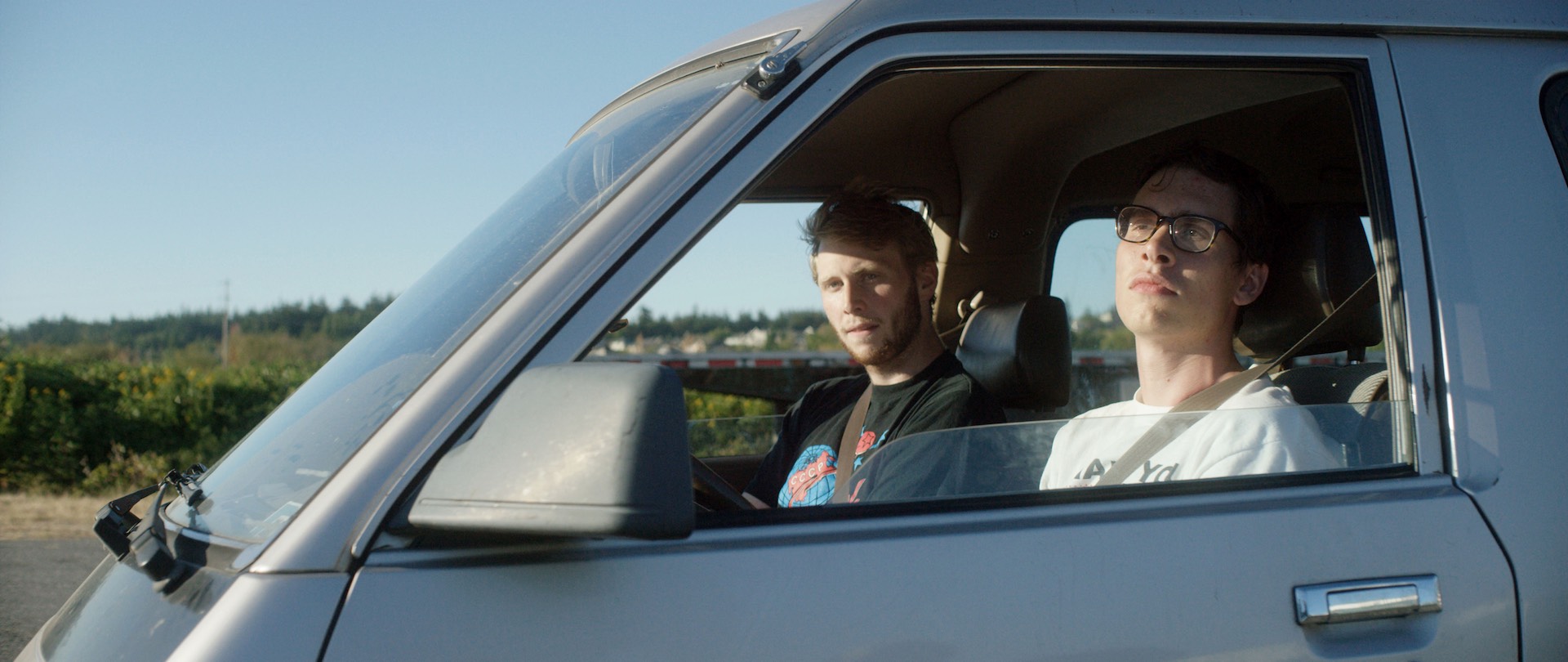If there is any sense of fairness in the world (spoiler alert: there isn’t) Mixtape Marauders would be assured unending cult status. The film would play on loop in college dorms, its dialogue referentially peppering numerous late-night “bullshit” conversations, and its nerdy, socially maladjusted characters would be adored by worldwide fans cosplaying as the stoner teens from middle-of-nowhere Washington state.
I don’t expect it to happen, but hey—I wouldn’t be surprised. S/W alum Peter Edlund has crafted the kind of low-key, very relatable, and extremely funny film that people become passionate about. Throw in a very prominent, and totally killer soundtrack, and this slice-of-life ode to misspent youth feels like a proclamation to kids from sleepy towns everywhere—”our film could be your life”.
The film follows a pair of weed-dealing best friends, Patrick (Peter McNally) and Cheech (Ian Edlund), as they work crappy jobs, get baked in abandoned churches, and endlessly obsess over “mixtapes” with near-religious fervor. Burning these music playlists to CD’s (which is nearly as anachronistic as the term “mixtape”), the duo believe strongly in their act of connoisseurship as a creative practice, and obsess over the philosophies and minutiae that inform the myriad decisions that go into making “the perfect mixtape”. Largely plotless, if there is an overriding narrative concern it is Patrick’s crush on Maggie. After laboring for 3 months on a personalized mixtape for his oblivious love—one that will explain the depth of his ardor and cause her to realize she is head-over-heels for him, Patrick teasingly refuses to let Cheech listen to it.
Mixtape Marauders is a weird, and deeply enjoyable mix of the contemporary and nostalgic. Obviously the “mixtape” concept is outmoded, but Patrick and Cheech’s musical eclecticism is a defining aspect of the current internet generation that has the entirety of recorded culture at their fingertips. Obsessing over nerdy pursuits of course is timeless, but the sparkling dialogue co-written by the director and his brother (who plays Cheech), and its hangout tone remind one of early Linklater. And while the music itself is full of current artists, with a wide mix of hip-hop and R&B, the film’s emotional climax is a heroic fuzzy guitar-driven track that would have been right at home at the height of the 80’s college-rock era.
If there is any nostalgic element that doesn’t age well, it’s the uncomplicated presentation of Patrick and Cheech’s exclusionary geekdom. As a culture we just had this conversation with Ready Player One and the problematic nature of lionizing the (largely White, male) nerd. Key moments of the film see Patrick and Cheech summarily dismiss multiple women’s inherent worth due to subjectively “bad” musical taste. I don’t necessarily subscribe to this line of thinking— depiction is not endorsement—and Peter Edlund, to his credit, seems to understand this line of thinking. In describing the film to us he relates, that “Patrick and Cheech can only understand the world through the context of music. That’s how they communicate with each other and why they struggle to communicate with everyone else. They’ve formed a deep bond through dumb mixtapes, which is probably what this film is most about, the little things we all debate, obsess over, and apply fictitious meaning to; the things that are incredibly stupid and incredibly important all at once.” If we keep seeing depictions of men idealizing women only to find reasons to devalue them, if we keep seeing depictions of pop culture fandom used as cultural gatekeeping, it is, perhaps, because in touches on something genuine in the culture, an alienated class of people whom we have only recently realized are so prevalent (and so powerful), and that living is painful and scary to them.
And I do think that the inherent patheticness of Patrick and Cheech comes through in the film, despite their witty, and self-assured opines on music and life featuring so prominently. A certain type of viewer will latch on to the pair as uncomplicated role-models, and as the protagonists of the film it’s impossible to not feel affection toward our pair of geeks. Yet Edlund, in seeking to capture something of his own experience in depicting small-town boredom does not go to lengths to romanticize his heroes, as even the music video style interludes of the film are careful to not divorce his characters from the dreary context of their lives.
Still, the film is simply a lot of fun. Full of personality, killer lines, and music-driven emotional moments, the overriding feeling imparted is that of a goofy smile. It is rare to find a short film with such voice, and after a tremendous festival run that recently culminated at Clermont-Ferrand, the film is destined to connect with an admiring audience on the internet. The Seattle-based Edlund was featured previously on this site for The New West, a modern teenage Western that Ivan Kander described as owing a lot of Rian Johnson’s seminal Brick, and in returning to his hometown and depicting a film that is a bit more personal, and highly divergent in tone, Edlund has cemented himself as a filmmaker of diverse capability and skill. Working with producer Megan Leonard who also edited the film and moonlights as a programmer for The Seattle International Film Festival and Cucalorus, the film team are currently developing Mixtape Marauders as a feature film.

 Jason Sondhi
Jason Sondhi